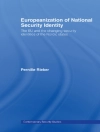Gas-Phase Chemistry in Space: From elementary particles to complex organic molecules is written by a collection of experts in the field of astrochemistry. The book introduces essential concepts that govern the formation, excitation and destruction of molecules at postgraduate and research levels. A broad range of topics are covered; from early universe chemistry and stellar nucleosynthesis, to the study of bimolecular reaction kinetics. Detailed description of the gas-phase process is provided and recent examples of the interplay between observational and laboratory astrophysics are examined. Using more than 100 figures, as well as examples, this work reveals, in detail, both theoretical and experimental perspectives that can be implemented in future discoveries.
قائمة المحتويات
Preface
About the editors
Contributors
Acknowledgements
1 – The chemistry of the early Universe
2 – Nucleosynthesis: the origin of the chemical elements
3 – Gas-phase chemistry: reactive bimolecular collisions
4 – Radiative processes in astrophysical molecules
5 – Electron collision processes
6 – Molecular Spectroscopy of Astrophysical Molecules
7 – Excitation of Astrophysical Molecules
8 – Applications. The Molecular View Point of Interstellar Observations.
عن المؤلف
François Lique studied and received his Ph D in physics in 2006 and is currently a professor at the Université Le Havre Normandie. His expertise lies in the use of quantum chemistry methods, the study of quantum dynamics of nuclei and astrophysical modelling.
Alexandre Faure obtained his Ph D in 1999 and has since become an academic at CNRS in Grenoble. His research focuses on molecular processes of astrophysical relevance, and mainly concerns quantum aspects.












